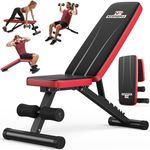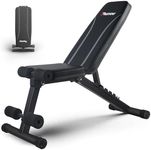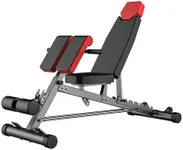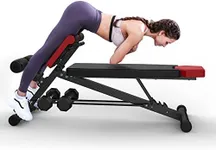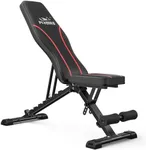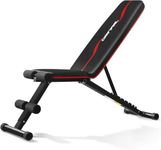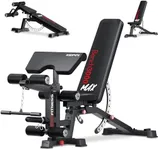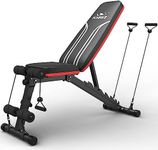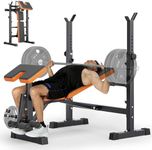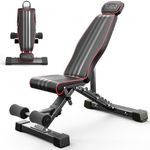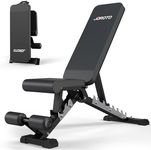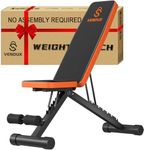Buying Guide for the Best Weight Benches
Choosing the right weight bench is important for anyone looking to build strength, improve fitness, or add versatility to their home gym. A good weight bench can support a wide range of exercises, from bench presses to step-ups, and should match your workout style, available space, and comfort needs. When shopping for a weight bench, it's important to understand the key features that affect safety, usability, and the types of exercises you can perform. By focusing on the main specifications, you can find a bench that fits your goals and helps you exercise safely and effectively.Weight CapacityWeight capacity refers to the maximum amount of weight the bench can safely support, including your body weight and any weights you are lifting. This is crucial for safety, as exceeding the limit can lead to accidents or damage. Benches typically range from around 300 pounds for basic models to over 1,000 pounds for heavy-duty options. If you are a beginner or do lighter workouts, a lower capacity may be sufficient, but if you plan to lift heavy or want a bench that will grow with your strength, choose one with a higher weight capacity.
AdjustabilityAdjustability describes whether the bench can change positions, such as flat, incline, or decline. This feature is important because it allows you to target different muscle groups and add variety to your workouts. Some benches are fixed and only offer a flat position, while others can be adjusted to multiple angles. If you want to perform a wide range of exercises, look for a bench with several adjustable positions. If your workouts are simple and focused, a flat bench may be all you need.
Bench Size and FootprintBench size and footprint refer to the physical dimensions of the bench and how much space it will take up in your workout area. This matters for both comfort during exercise and for fitting the bench into your available space. Benches come in compact, standard, and oversized versions. If you have limited space, a compact or foldable bench is ideal. If you are taller or want more stability, a larger bench may be more comfortable and secure.
Padding and ComfortPadding and comfort relate to the thickness and quality of the cushioning on the bench. Good padding supports your body and reduces discomfort during longer workouts. Benches with thin or low-quality padding can be uncomfortable and may not provide enough support. If you plan to use the bench frequently or for heavy lifting, look for one with thick, firm padding and a durable cover. For occasional or light use, moderate padding may be sufficient.
Stability and Build QualityStability and build quality refer to how solid and well-constructed the bench is. A stable bench won’t wobble or shift during use, which is important for safety and confidence while exercising. Benches made from heavy-duty steel frames are generally more stable and durable. If you plan to lift heavy weights or want a bench that lasts, prioritize strong materials and a sturdy design. For lighter workouts, a simpler build may be adequate.
Extra FeaturesExtra features can include things like built-in racks, leg holders, wheels for easy movement, or the ability to fold for storage. These features can add convenience or expand the types of exercises you can do. If you want a bench that is easy to move or store, look for wheels or a folding design. If you want to do decline exercises or need extra support, leg holders are useful. Consider which features match your workout style and space needs.
